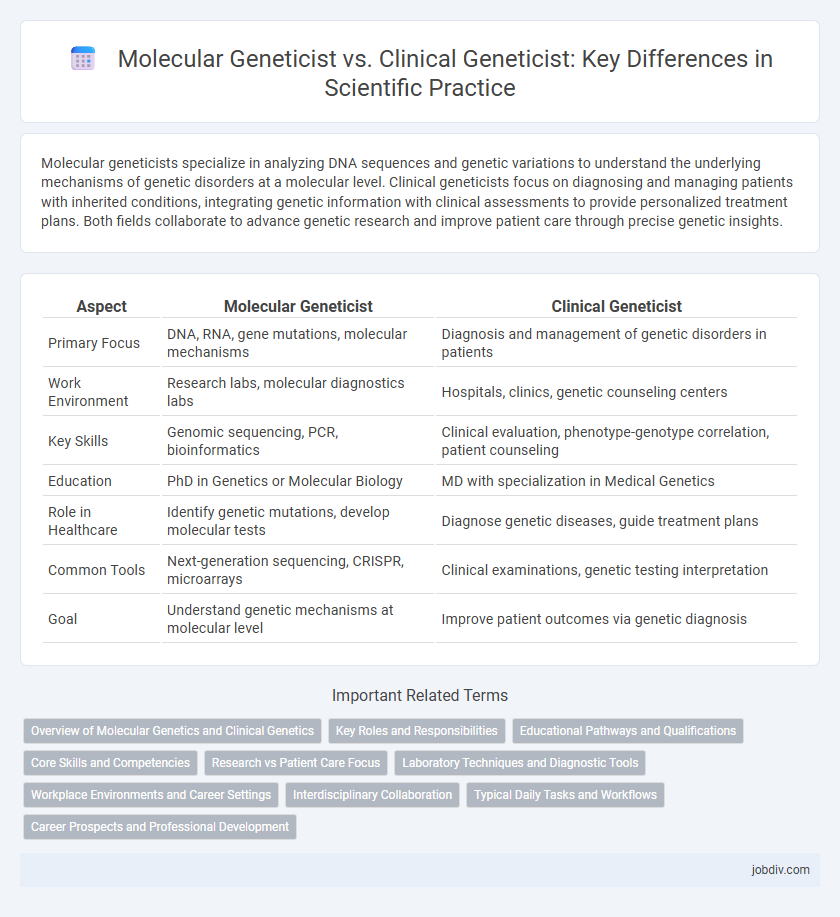Molecular geneticists specialize in analyzing DNA sequences and genetic variations to understand the underlying mechanisms of genetic disorders at a molecular level. Clinical geneticists focus on diagnosing and managing patients with inherited conditions, integrating genetic information with clinical assessments to provide personalized treatment plans. Both fields collaborate to advance genetic research and improve patient care through precise genetic insights.
Table of Comparison
| Aspect | Molecular Geneticist | Clinical Geneticist |
|---|---|---|
| Primary Focus | DNA, RNA, gene mutations, molecular mechanisms | Diagnosis and management of genetic disorders in patients |
| Work Environment | Research labs, molecular diagnostics labs | Hospitals, clinics, genetic counseling centers |
| Key Skills | Genomic sequencing, PCR, bioinformatics | Clinical evaluation, phenotype-genotype correlation, patient counseling |
| Education | PhD in Genetics or Molecular Biology | MD with specialization in Medical Genetics |
| Role in Healthcare | Identify genetic mutations, develop molecular tests | Diagnose genetic diseases, guide treatment plans |
| Common Tools | Next-generation sequencing, CRISPR, microarrays | Clinical examinations, genetic testing interpretation |
| Goal | Understand genetic mechanisms at molecular level | Improve patient outcomes via genetic diagnosis |
Overview of Molecular Genetics and Clinical Genetics
Molecular genetics involves the study of genes at a molecular level, focusing on DNA, RNA, and protein interactions to understand genetic variations and mutations that cause diseases. Clinical genetics applies this molecular knowledge to diagnose, manage, and counsel patients with inherited disorders, integrating genetic testing results into personalized medical care. Molecular geneticists primarily conduct laboratory research and genetic testing, while clinical geneticists interpret these findings to guide clinical decision-making and patient treatment.
Key Roles and Responsibilities
Molecular geneticists specialize in analyzing DNA, RNA, and gene expression to identify genetic mutations and understand molecular mechanisms of diseases, often working in research or diagnostic laboratories. Clinical geneticists focus on diagnosing and managing patients with inherited disorders, providing genetic counseling, and developing personalized treatment plans based on genetic information. Both professionals collaborate to advance precision medicine but have distinct roles emphasizing laboratory research versus patient care.
Educational Pathways and Qualifications
Molecular geneticists typically pursue a PhD in molecular genetics or a related field, emphasizing research in DNA sequencing, gene expression, and molecular diagnostics. Clinical geneticists usually complete a medical degree followed by specialized residency and fellowship training in medical genetics to diagnose and manage inherited disorders. Both career paths require rigorous education, but clinical geneticists combine medical expertise with genetics, while molecular geneticists focus primarily on laboratory research and genetic analysis.
Core Skills and Competencies
Molecular Geneticists specialize in analyzing DNA, RNA, and proteins to identify genetic mutations using techniques like PCR and gene sequencing, emphasizing laboratory research and molecular diagnostics. Clinical Geneticists focus on patient care by diagnosing hereditary conditions through detailed family histories, physical examinations, and genetic counseling, requiring strong clinical assessment and communication skills. Both disciplines necessitate expertise in genetics, bioinformatics, and ethical considerations, yet their core competencies diverge between laboratory-based molecular analysis and patient-centered clinical evaluation.
Research vs Patient Care Focus
Molecular geneticists primarily concentrate on research involving the identification and analysis of genes, mutations, and molecular mechanisms underlying genetic disorders. Clinical geneticists focus on diagnosing, managing, and counseling patients with inherited conditions, integrating genetic knowledge into personalized patient care. The distinction lies in molecular geneticists advancing scientific understanding while clinical geneticists apply genetic insights directly to healthcare and treatment strategies.
Laboratory Techniques and Diagnostic Tools
Molecular geneticists specialize in advanced laboratory techniques such as polymerase chain reaction (PCR), fluorescence in situ hybridization (FISH), and next-generation sequencing (NGS) to identify genetic mutations at the molecular level. Clinical geneticists apply diagnostic tools including karyotyping, chromosomal microarray analysis, and biochemical assays to diagnose inherited disorders and guide patient management. Both fields integrate molecular diagnostics but differ in the clinical application versus laboratory research focus.
Workplace Environments and Career Settings
Molecular geneticists primarily work in research laboratories, biotechnology firms, and academic institutions where they focus on analyzing DNA, RNA, and protein interactions at the molecular level. Clinical geneticists are typically employed in hospitals, medical centers, and genetic counseling clinics, specializing in diagnosing and managing hereditary disorders in patients. Both career settings demand collaboration with interdisciplinary teams, though molecular geneticists emphasize experimental research, while clinical geneticists engage in patient care and personalized medicine.
Interdisciplinary Collaboration
Molecular geneticists analyze DNA sequences and genetic mutations to understand disease mechanisms, while clinical geneticists evaluate patients and interpret genetic test results for diagnosis and management. Their interdisciplinary collaboration enhances precision medicine by integrating molecular data with clinical insights, leading to improved patient outcomes. Effective communication between these specialists accelerates the translation of genomic discoveries into targeted therapies and personalized healthcare.
Typical Daily Tasks and Workflows
Molecular geneticists primarily analyze DNA sequences, perform gene mapping, and develop genetic testing techniques in laboratory settings to identify mutations and verify genetic markers. Clinical geneticists focus on diagnosing and managing inherited disorders by evaluating patient histories, conducting physical examinations, and interpreting genetic test results to guide treatment plans. Collaboration between molecular and clinical geneticists ensures accurate diagnosis and personalized care in genetic medicine.
Career Prospects and Professional Development
Molecular geneticists specialize in DNA analysis and gene identification techniques, with career prospects largely centered around research institutions, biotechnology firms, and academic settings where innovation in genetic engineering and personalized medicine is paramount. Clinical geneticists focus on diagnosing and managing hereditary disorders within healthcare environments, offering strong professional development in patient-oriented roles, genetic counseling, and clinical trials. Both career paths benefit from advancements in genomic technologies, but molecular geneticists often pursue further specialization in bioinformatics and molecular diagnostics, while clinical geneticists expand expertise through medical genetics fellowships and interdisciplinary collaborations.
Molecular Geneticist vs Clinical Geneticist Infographic

 jobdiv.com
jobdiv.com